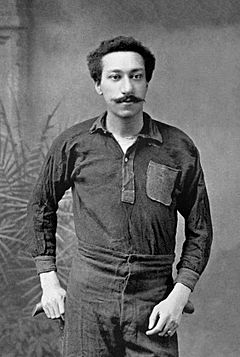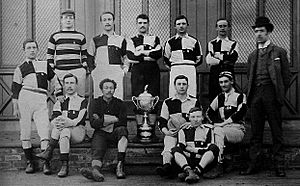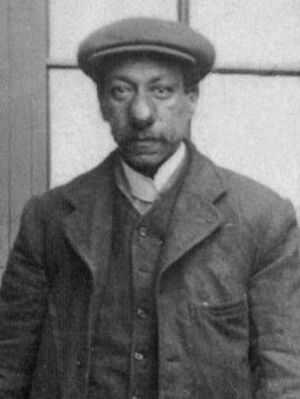Arthur Wharton facts for kids
 |
|||
| Personal information | |||
|---|---|---|---|
| Date of birth | 28 October 1865 | ||
| Place of birth | Jamestown, Gold Coast | ||
| Date of death | 13 December 1930 (aged 65) | ||
| Place of death | Edlington, Yorkshire, England | ||
| Position(s) | Goalkeeper/Winger | ||
| Senior career* | |||
| Years | Team | Apps | (Gls) |
| 1885–1886 | Darlington | ||
| 1886–1888 | Preston North End | ||
| 1889–1894 | Rotherham Town | 19 | (0) |
| 1894–1895 | Sheffield United | 1 | (0) |
| 1895–1896 | Rotherham Town | 15 | (0) |
| 1896–1897 | Stalybridge Rovers | ||
| 1897–1899 | Ashton North End | ||
| 1899–1901 | Stalybridge Rovers | ||
| 1901–1902 | Stockport County | 6 | (0) |
| *Club domestic league appearances and goals | |||
Arthur Wharton (born October 28, 1865 – died December 12, 1930) was an amazing athlete. Many people believe he was the first black professional footballer in the world. He was also the first black player to play in the Football League.
Contents
Arthur Wharton's Early Life
Arthur Wharton was born in Jamestown, which was then called the Gold Coast (now Accra, Ghana). His father, Henry Wharton, was a missionary from Grenada. His mother, Annie Florence Egyriba, was a princess from the Fante people in Ghana.
In 1882, when Arthur was 19, he moved to England. He planned to train as a Methodist missionary. But he soon decided to become a full-time athlete instead.
A Talented All-Round Athlete
Arthur was good at many sports. In 1886, he set an amateur world record in the 100-yard sprint. He ran it in just 10 seconds! This happened at the AAA championship.
He also loved cycling and cricket. He played for local teams in Yorkshire and Lancashire. But he is most famous for his football skills. While other mixed-heritage players like Robert Walker and Andrew Watson played before him as amateurs, Arthur Wharton was the first to become a professional footballer.
Arthur Wharton's Football Career

Arthur started playing as a goalkeeper for Darlington. He was still an amateur then. Preston North End noticed him when he played against them.
He joined Preston North End as an amateur. He helped them reach the FA Cup semi-finals in the 1886–87 season. In one match, he kept a "clean sheet" (meaning the other team didn't score). A newspaper called his goalkeeping "one of the best exhibitions... I have seen for a long time."
Arthur was part of Preston's famous "Invincibles" team in the 1880s. But he left in 1888 to focus on his running. So, he wasn't there when Preston won "the Double" (both the league and cup) in 1888–89.
Playing for Sheffield and Rotherham
In 1888, Arthur played for a team called 'Sheffield Wednesday and District' against Preston North End. The match was tough, and his team lost badly. Some fans were upset with his performance that day.
He returned to football in 1889, joining Rotherham Town. This time, he signed as a professional player. In 1890, he married Emma Lister in Rotherham. By 1891, he was also running a pub called the Albert Tavern in Rotherham.
In 1894, he moved to Sheffield United. He was a backup goalkeeper to the famous William "Fatty" Foulke. During the 1894–95 season, Arthur played three games for Sheffield United. One of these was a First Division game. This made him the first mixed-heritage player to play in England's top football league!
After Sheffield United, he played for Stalybridge Rovers and Ashton North End. He even opened a tobacco shop in Ashton-under-Lyne. When Ashton North End went out of business, he returned to Stalybridge Rovers. He finished his career playing for Stockport County in the Second Division in 1901–02. Besides playing in goal, he sometimes played as a winger (an outfield player).
Arthur Wharton's Legacy
Arthur Wharton stopped playing football in 1902. He then worked as a haulage worker in a coal mine in Edlington. By 1911, he was living in Moor Thorpe, West Yorkshire, with his wife Emma.
When World War I started in 1914, Arthur joined the Volunteer Training Corps. This group was like the Home Guard in World War II. He volunteered to help defend Britain if needed.
Arthur Wharton passed away in 1930. He was buried in an unmarked grave. But in 1997, after a campaign by groups like Football Unites, Racism Divides, a headstone was placed on his grave.
In 2003, Arthur Wharton was honored by being added to the English Football Hall of Fame. This was to recognize his huge impact on the game. There is also a campaign to build statues of him in Darlington and Rotherham to remember his achievements.
In 2012, a small statue of Arthur Wharton was given to Sepp Blatter at the headquarters of FIFA. It is now on display there permanently. On October 16, 2014, a statue honoring Arthur Wharton was unveiled at St George's Park National Football Centre. In 2020, a mural was also unveiled in Darlington on his 155th birthday.
Career statistics
| Club | Season | League | FA Cup | Other | Total | |||||
|---|---|---|---|---|---|---|---|---|---|---|
| Division | Apps | Goals | Apps | Goals | Apps | Goals | Apps | Goals | ||
| Preston North End | 1886–87 | — | 6 | 0 | — | 6 | 0 | |||
| 1887–88 | — | 0 | 0 | — | 0 | 0 | ||||
| Total | — | 6 | 0 | — | 6 | 0 | ||||
| Darlington | 1887–88 | — | 1 | 0 | — | 1 | 0 | |||
| Rotherham Town | 1893–94 | Division Two | 19 | 0 | 1 | 0 | — | 20 | 0 | |
| Sheffield United | 1894–95 | Division One | 1 | 0 | 0 | 0 | 1 | 0 | 2 | 0 |
| Rotherham Town | 1895–96 | Division Two | 15 | 0 | 5 | 0 | — | 20 | 0 | |
| Stockport County | 1901–02 | Division Two | 6 | 0 | 0 | 0 | 1 | 0 | 7 | 0 |
| Career total | 41 | 0 | 13 | 0 | 2 | 0 | 56 | 0 | ||
See also
 In Spanish: Arthur Wharton para niños
In Spanish: Arthur Wharton para niños
 | William M. Jackson |
 | Juan E. Gilbert |
 | Neil deGrasse Tyson |


